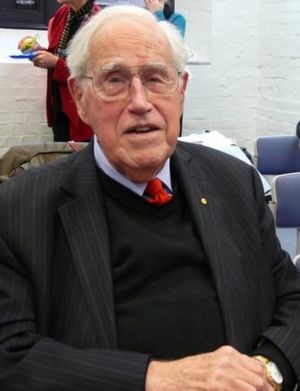Basil Hetzel facts for kids
Quick facts for kids
Basil Hetzel
|
|
|---|---|

Dr Basil Hetzel at the University of South Australia Library, City East campus, 2011
|
|
| Lieutenant-Governor of South Australia | |
| In office 28 May 1992 – 18 April 2000 |
|
| Preceded by | Condor Laucke |
| Succeeded by | Bruno Krumins |
| Personal details | |
| Born | 13 June 1922 London, England |
| Died | 4 February 2017 (aged 94) Adelaide, South Australia |
| Nationality | British, Australian |
| Alma mater | University of Adelaide |
| Profession | Scientist (Medicine, Epidemiology) |
Basil Stuart Hetzel AC (born June 13, 1922 – died February 4, 2017) was an Australian medical researcher. He made a huge difference in the fight against iodine deficiency. This problem can cause serious health issues like goitre (a swollen neck) and cretinism (a condition affecting brain development) around the world.
Contents
Early Life and Education
Basil Hetzel was born in London, England. His parents, Elinor and Kenneth Stuart Hetzel, were from South Australia. They were in London because his father, Kenneth, worked as an anaesthetist (a doctor who gives medicine to make patients sleep during surgery).
In 1925, Basil and his family moved back to Adelaide, South Australia. He and his brother Peter went to King's College and St Peter's College, Adelaide for school.
Basil studied medicine at the University of Adelaide from 1940 to 1944. During World War II, he was allowed to continue his studies because doctors were greatly needed. He later tried to join the Royal Australian Air Force as a medical officer. However, he was not accepted because he had been very sick with tuberculosis in 1945.
In the 1950s, Basil became a Fulbright Research Scholar. This allowed him to study and work in the United States, including at New York Hospital. In 1954, he and his family moved to London. There, he continued his research at St Thomas' Hospital.
Amazing Career and Research
After finishing his medical studies, Basil Hetzel worked at Parkside Mental Hospital in Adelaide. Later, he became the first Michell Research Scholar at the University of Adelaide. He also worked at the Queen Elizabeth Hospital, Adelaide. In 2001, a special medical research center at this hospital was named the Basil Hetzel Institute in his honor.
Basil also helped start the South Australian Mental Health Association in 1956. This group helped create Lifeline, a service that still offers support to people in crisis today.
He also led the Division of Human Nutrition at the CSIRO. This is a big Australian science agency. From 1992 to 1998, Basil was the Chancellor of the University of South Australia. This means he was the head of the university. In 2005, a building for health sciences at the university was named the Basil Hetzel building.
Basil Hetzel also served as the Lieutenant Governor of South Australia from 1992 to 2000. This is a very important role in the state government.
Fighting Iodine Deficiency
Basil Hetzel's most important work was his research into iodine deficiency. He traveled to remote areas of Papua New Guinea. There, he found that many people had goitre and cretinism because they did not get enough iodine in their food. He showed that adding iodine to people's diets could completely prevent these illnesses.
In the 1980s, Basil became a global champion for iodine. He was supported by the Australian Agency for International Development. Thanks to his efforts, adding iodine to table salt became common. This helped create the Iodine Global Network. This group, also known as the International Council for Control of Iodine Deficiency Disorders (ICCIDD), works to prevent iodine deficiency worldwide.
The ICCIDD gets funding from many groups, including the United Nations and the World Health Organization. They help countries set up programs to prevent iodine deficiency. Because of their work, many countries now require that salt for people and animals must have iodine added to it. Many people say this success is thanks to Basil Hetzel's "tireless dedication."
In 2010, the ICCIDD created the Basil Hetzel International Award. This award recognizes people who help spread awareness about iodine nutrition. By the year 2000, it was estimated that 70% of homes worldwide were using iodized salt.
In the 1960s, his research in Papua New Guinea also showed a clear link. It proved that not enough iodine could cause serious brain damage in unborn babies.
Personal Life
Basil Hetzel married Mary Helen Eyles in 1946. They had five children: Susan, Richard, Robert, Jay, and Elizabeth. Helen passed away in 1980. In 1983, Basil married Anne Fisher.
Basil Hetzel was a member of the Pilgrim Uniting Church in Adelaide. He passed away on February 4, 2017, at the age of 94.
Honours and Awards
Basil Hetzel received many awards for his important work:
- Pollin Prize for Pediatric Research, 2009
- Prince Mahidol Award from the King of Thailand
- Named a National Living Treasure by the National Trust of Australia, 2004
- The Clinical Research Centre at the Queen Elizabeth Hospital, Adelaide was named 'The Basil Hetzel Institute for Medical Research' in his honour, 2001
- Doctor of the University, University of South Australia, 1999
- RSL Anzac Peace Prize, 1997
- Companion of the Order of Australia, 1990
- Honorary Professor at the Tianjin Medical University, 1989
- Susman Prize for Medical Research, Royal Australasian College of Physicians, 1964
- Alwyn Smith Prize, Faculty of Public Health Medicine, United Kingdom, 1993
 | Chris Smalls |
 | Fred Hampton |
 | Ralph Abernathy |

